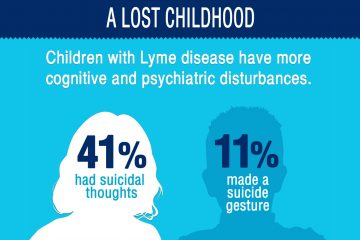Lyme Disease – Early vs. Chronic If Lyme disease is not diagnosed and treated early, it may become late-stage or chronic.
L yme disease may spread to any part of the body and affect any body system. Its symptoms often are non-specific and overlap with those of other diseases, like chronic fatigue, fibromyalgia, rheumatoid arthritis, multiple sclerosis, Parkinson’s disease, ALS, depression and Alzheimer’s disease. Many Lyme patients report being misdiagnosed with a different condition before being properly diagnosed with Lyme disease.
If Lyme disease is not diagnosed and treated early, it may become late-stage or chronic. This may also occur when early treatment is inadequate. While some symptoms of chronic or late stage Lyme disease are similar to those of early Lyme, as the graphic below shows, there are important differences.
Typically, it affects more than one body system. In our Quality Of Life Survey (See below for a link), which drew over 5,000 responses, patients with chronic Lyme disease reported an average of three severe or very severe symptoms, with 74% reporting at least one symptom as severe or very severe.
An extensive list of symptoms of chronic Lyme disease (see below for a link) was developed by Dr. Joseph Burrascano, a pioneer in treating chronic Lyme disease…… Join or login below to continue reading.






























I was trying to see if I had a problem with Lyme.
Want to know if Lyme disease can be diagnosed after 40 years of no treatment. I have chronic migraine headaches, fibromyalgia, chronic depression, and arthritis and back pain.
Yes, we recommend you find a Lyme doctor. Use this link to find one in your area: https://www.lymedisease.org/find-lyme-literate-doctors/